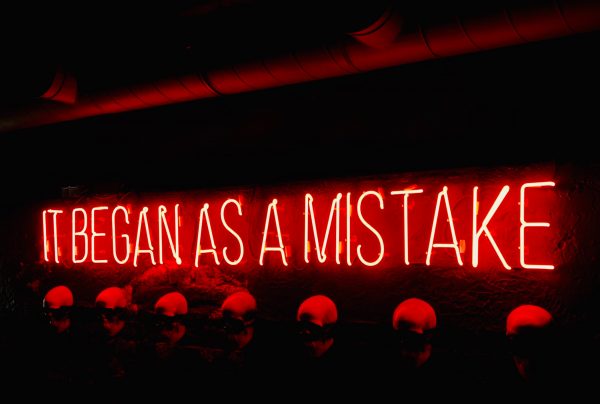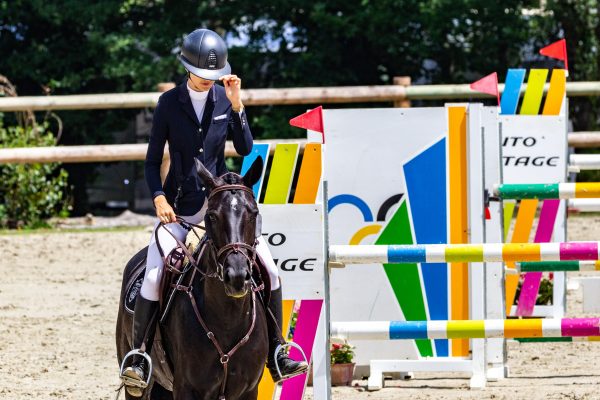 Sports Psychologist Dr Lynn Pal writes exclusively for The Arabian Breeders’ Magazine. This article, Dwelling on the past was printed in June 2022. To sign up to the magazine for print-only content, click here.
Sports Psychologist Dr Lynn Pal writes exclusively for The Arabian Breeders’ Magazine. This article, Dwelling on the past was printed in June 2022. To sign up to the magazine for print-only content, click here.
Dwelling on the past

Once a mistake is done, it should be done.
We have all been in the situation where we have made an error. It might be a small mistake such as forgetting to attach a document or a spelling error in an e-mail. You might have forgotten a significant piece of information in a presentation or said the wrong thing in an interview. You might have forgotten a dressage test or felt nervous and performed badly. We have all said something we regret, or behaved in a certain way, or failed to perform under pressure when it really counts. The real issue is not the mistake or error itself. What hurts the performance is our memory of the mistake and our dwelling on the error.
Everyone makes mistakes but not everyone gets angry with themselves for making a mistake.
If we are a perfectionist, it is hard to move on from an error. Once a mistake has been made, it should be done and forgotten but many of us will continue to think about it long after the event. If we keep the memory alive, it will never be in the past. Ruminating about a mistake and beating ourselves up over it will not help future success and improvement.
Dwelling on the past feeds the moment with energy and causes it to fester and grow in your mind. Focussing on our mistakes keeps us stuck in the past. It results in us being physically present in the moment but not mentally. It means we might be physically performing but our mind is focussing on something else. We might be thinking about avoiding making the mistake again, which can result in tension and being overly cautious and that usually results in further mistakes being made. Dwelling on a mistake will prevent enjoyment and provide a distraction. It is impossible to expect your best performance when you are thinking about something else. The only way to perform at our best is to clear our mind of previous performances and move forward. How do we do this?

Forget the mistake and remember the lesson learnt.
While simply saying ‘move on’ is very easy, actually clearing the mind is very difficult. It takes immense mental strength and will power to focus on the present and the ‘here and now’. We have a choice on the thoughts we can focus on.
Firstly, we need to recognise we are dwelling on a past mistake we have made. Next, we need to remind ourselves we cannot get that moment back. We cannot correct the mistake. No matter how often we think about the mistake, we cannot change the outcome. Finally, we need to refocus on our current situation. What do we need to do right now? Think about our current attitude, actions, and behaviour. Provide ourselves with clear instructions on what we need to do now.
The mistake is being afraid to make a mistake.
Making a mistake is not a bad thing. It is how we grow and how we improve ourselves. We are all human. We need to look at our beliefs regarding our performance and our expectations. Do we believe we should perform perfectly 100% of the time? These are impossible standards to set ourselves. We need to allow ourselves days were we are simply average or below average. Always remind yourself your performance is dependent on the conditions around you. Our skills are a compromise between our abilities and what is possible depending on the prevailing circumstances.

The real test and adventure in life is not how a person navigates a perfect life but how they react to setbacks and obstacles. It is impossible to be flawless in life as no one is perfect. Errors are simply part of life and our equestrian world.
Aim for excellence and never perfection.
There are thousands of examples of athletes, entrepreneurs, and politicians who have publicly and dramatically made mistakes, yet still managed to reinvent themselves and find future success. Such individuals have managed to fail, learn from the mistake, and move past the mistake. They demonstrate that following a mistake, we are all going to be just fine. While we should always thrive for excellence, we should not be too critical of ourselves when we do not always achieve it.
Always choose to focus on the brand new opportunity right in front of you and make the most of it.

Top tips
- If you find you have made a mistake, it is normal to feel embarrassed, distressed, frustrated, or upset. Allow yourself time to feel the emotions but not too long. Give yourself say only 10 seconds to ponder and force yourself to think about something else or do another activity.
- Sometimes you simply need to acknowledge the mistake and move on. The majority of the time other people will be so caught up with their own goals, projects and weaknesses they will not even register yours or quickly forget about it.
- Quickly create a plan so the same mistake will never happen again. Were you trying to multitask? Were you rushing a deadline? Were you unprepared? Did you practice enough?
- Sometimes all that is required is an acknowledgment you have made a mistake and a simple sorry.
- Take a deep breath and remind yourself you have overcome the error. You survived the error and learnt from it.
- If you find you are constantly emotionally thinking about a specific mistake, look to do a healthy exercise to distract from the emotion such as going for a walk or jog, making a cup of tea, or writing in a diary.
- When you are emotional, it is very difficult to keep perspective of things. Make sure your emotional response is proportional to the mistake you have made. There are few circumstances where an error is a life or death situation. Most errors can be resolved or corrected.
- Take time in your day to rest. Eat, drink and sleep are fundamentals to performing at your peak. If you are hungry, thirsty, or tired it will affect your attention, alertness, concentration, reasoning, and problem solving, and that is when mistakes are likely to occur.
- Ask yourself – if someone else made the same mistake, what advice would you give them?
 Dr Lynn Pal [BSc (Hons), PGDip Sport, PGC (BPS personality A & B), PGDip CBT, MBCT, PhD, PGCHE, C Psychol.] is a Neurobiological and Behavioural Chartered Psychologist with a background in Biomedical Sciences and Psychology. Specialist professional qualifications and training include cognitive behavioural therapy, mindfulness, sport psychology and psychoneurobiology. Experience includes 15 years in teaching undergraduate and postgraduate students, an academic career including national and international research publications, consultancy work in national audits and national/international sporting teams, research supervision and a portfolio of sport, health and clinical clients. Dr Lynn Pal provides free sport psychology tips and research updates on social media www.facebook.com/drlynnpal/. If you are interested in working with Lynn please contact lynn.s.pal@gmail.com
Dr Lynn Pal [BSc (Hons), PGDip Sport, PGC (BPS personality A & B), PGDip CBT, MBCT, PhD, PGCHE, C Psychol.] is a Neurobiological and Behavioural Chartered Psychologist with a background in Biomedical Sciences and Psychology. Specialist professional qualifications and training include cognitive behavioural therapy, mindfulness, sport psychology and psychoneurobiology. Experience includes 15 years in teaching undergraduate and postgraduate students, an academic career including national and international research publications, consultancy work in national audits and national/international sporting teams, research supervision and a portfolio of sport, health and clinical clients. Dr Lynn Pal provides free sport psychology tips and research updates on social media www.facebook.com/drlynnpal/. If you are interested in working with Lynn please contact lynn.s.pal@gmail.com
You can read more from The Arabian Breeders’ Magazine here.

 Sports Psychologist Dr Lynn Pal writes exclusively for The Arabian Breeders’ Magazine. This article, Dwelling on the past was printed in June 2022. To sign up to the magazine for print-only content, click
Sports Psychologist Dr Lynn Pal writes exclusively for The Arabian Breeders’ Magazine. This article, Dwelling on the past was printed in June 2022. To sign up to the magazine for print-only content, click